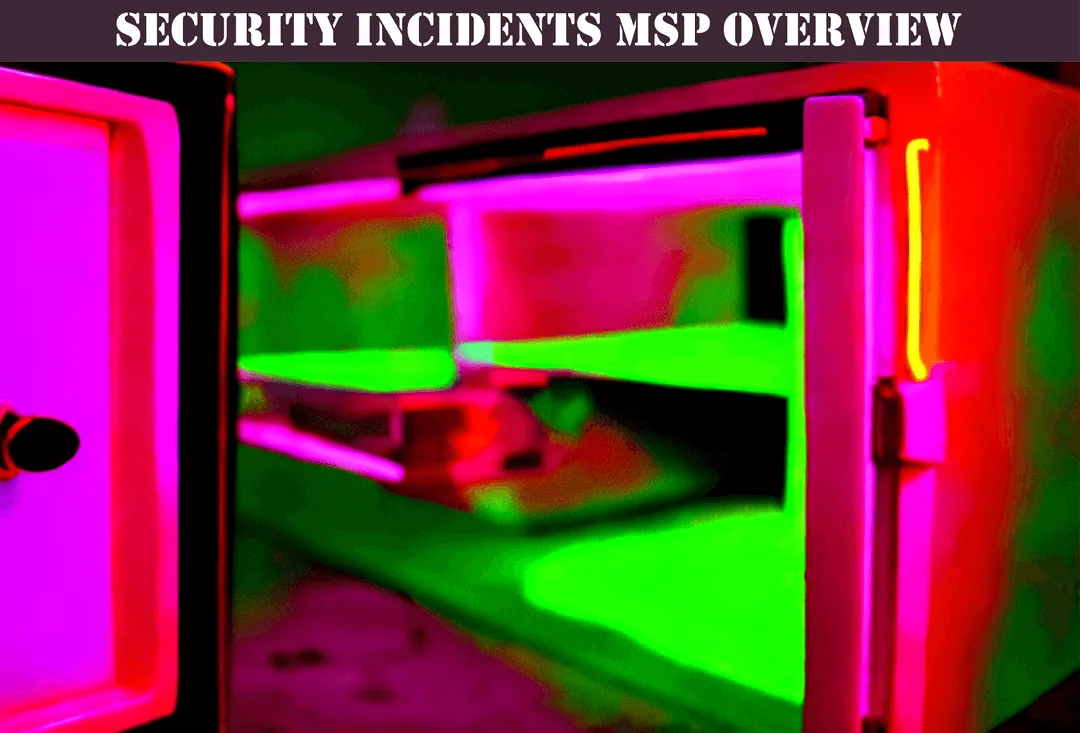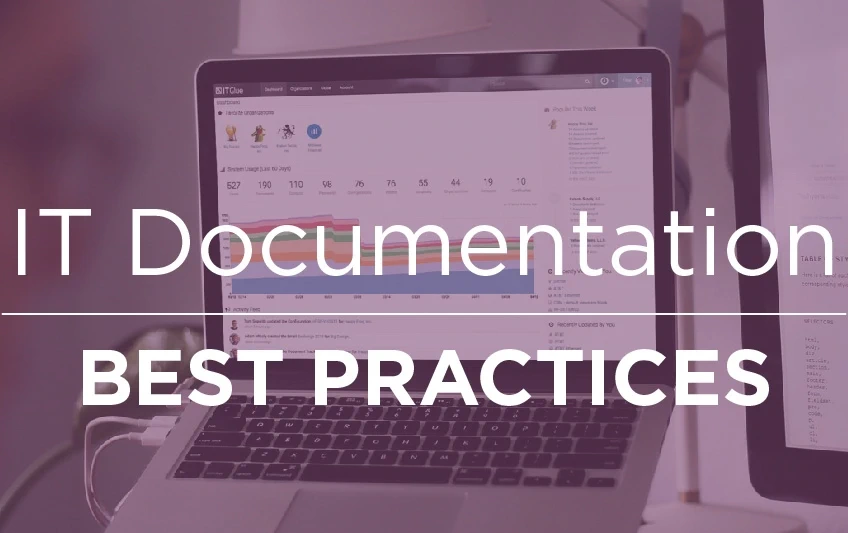Security Incidents MSP Overview 2025

As businesses increasingly rely on technology for their operations, the need for reliable and secure managed services providers (MSPs) has never been more critical. MSPs are third-party service providers that manage IT infrastructure and services for businesses. They offer a range of services, including cloud computing, cybersecurity, and data management, among others.
However, the rise in cybersecurity threats has brought about an increasing need for MSPs to prioritize security measures. With cybercriminals becoming more sophisticated and the risk of security incidents escalating, MSPs need to be prepared to handle security incidents and protect their clients' data from potential attacks.
To understand security incidents and their implications for MSPs, it is crucial to review the fundamentals and basics of security incidents. These incidents can include data breaches, ransomware attacks, and phishing scams, among others. Common causes of security incidents include weak passwords, human error, and software vulnerabilities.

1 Hour Consult $250
IT Glue Based Documentation
Concentrated 1 hour session of MSP documentation wisdom.
Count Me InMSPs must have robust security measures in place to prevent security incidents from happening. This includes having an updated and comprehensive Managed Services Provider Documentation, implementing access controls, and regularly conducting security audits. In the event of a security incident, MSPs must act quickly to mitigate the damage and restore services to their clients.
The growing threat of state actors also poses a significant risk to MSPs. State actors are nation-states or other organized groups that use their resources to launch cyber attacks. These attacks are often sophisticated and difficult to detect, making them even more dangerous. Recently, there has been an increase in state-sponsored attacks on MSPs, making it essential for MSPs to have adequate defenses in place to protect themselves and their clients.
In North America, MSPs are a crucial component of the technology industry, providing services to businesses of all sizes. As such, they must prioritize security to safeguard their clients' sensitive data and maintain their reputation. The consequences of a security incident can be severe, including financial losses, loss of trust, and legal liabilities.
In the next section, we will review the fundamentals and basics of security incidents for MSPs in more detail. We will also explore the steps that MSPs can take to prevent security incidents and mitigate their impact in case of an incident.
Fundamentals and Basics of Security Incidents for MSPs
Security incidents are a significant threat to businesses and MSPs that manage IT infrastructure and services. Security incidents can include data breaches, ransomware attacks, and phishing scams, among others. Common causes of security incidents include weak passwords, human error, and software vulnerabilities. MSPs need to understand the fundamentals and basics of security incidents to ensure they are adequately prepared to handle security incidents and protect their clients' data from potential attacks.
Types of Security Incidents
Security incidents can be categorized into several types, including:
Data breaches
A data breach is an unauthorized access or exposure of sensitive or confidential data. A data breach can occur due to various reasons, such as system vulnerabilities, phishing attacks, or social engineering tactics. The consequences of a data breach can be severe, leading to loss of data, financial losses, and reputational damage.
Ransomware attacks
A ransomware attack is a type of malware that encrypts data on a victim's system and demands a ransom payment to restore access to the data. Ransomware attacks can be devastating, leading to data loss, financial losses, and reputational damage.
Phishing scams
Phishing scams are fraudulent attempts to obtain sensitive information, such as usernames, passwords, and credit card details, by posing as a trustworthy entity. Phishing scams can occur through email, social media, or other forms of digital communication. The consequences of a successful phishing scam can be severe, leading to financial losses, data breaches, and reputational damage.
Common Causes of Security Incidents
Several factors can contribute to security incidents, including:
Weak passwords
Weak passwords can be easily guessed or cracked, leading to unauthorized access to sensitive data. MSPs must ensure their clients use strong passwords and implement multi-factor authentication to protect against password-related security incidents.
Human error
Human error, such as accidentally sending sensitive information to the wrong person or misconfiguring a system, can lead to security incidents. MSPs must provide regular training to their clients' employees to minimize human errors that can lead to security incidents.

1 Hour Consult $250
IT Glue Based Strategies
Consistent Trustworthy Documentation Is The Last Competetive Advantage For MSPs.
FASTPASS HERESoftware vulnerabilities
Software vulnerabilities can be exploited by cybercriminals to gain unauthorized access to a system or data. MSPs must ensure their clients' software is up-to-date and has the latest security patches to minimize the risk of security incidents due to software vulnerabilities.
Impact of Security Incidents on MSPs and their Clients
Security incidents can have severe consequences for MSPs and their clients, including:
Financial losses
Security incidents can result in financial losses for both MSPs and their clients. The cost of responding to a security incident, such as investigating the incident and restoring services, can be significant. Additionally, a security incident can result in legal liabilities and fines, leading to further financial losses.
Loss of trust
A security incident can result in the loss of trust between MSPs and their clients. Clients rely on MSPs to manage their IT infrastructure and services securely. A security incident can undermine that trust, leading to clients seeking services elsewhere.
Legal liabilities
Security incidents can lead to legal liabilities for MSPs and their clients. Depending on the nature of the incident, MSPs and their clients may be liable for damages resulting from the incident.
Best Practices for Preventing Security Incidents
MSPs can implement several best practices to prevent security incidents, including:
Managed Services Provider Documentation
MSPs must have a comprehensive Managed Services Provider Documentation to ensure they have a clear understanding of their clients' IT infrastructure and services. This documentation should include details such as network diagrams, security policies, and disaster recovery plans. Having comprehensive documentation can help MSPs identify potential security risks and implement appropriate security measures.
Best Practices for Preventing Security Incidents
MSPs can implement several best practices to prevent security incidents and ensure the security of their clients' data. Here are some of the best practices that MSPs should consider:
Managed Services Provider Documentation
MSPs must have a comprehensive Managed Services Provider Documentation that includes detailed information about their clients' IT infrastructure and services. This documentation should include network diagrams, security policies, disaster recovery plans, and other essential details. Having comprehensive documentation can help MSPs identify potential security risks and implement appropriate security measures.
Access Controls
Access controls are an essential component of any security strategy. MSPs should implement appropriate access controls to ensure that only authorized personnel can access sensitive data and systems. This includes implementing multi-factor authentication, strong passwords, and regular password updates.
Regular Security Assessments
MSPs should conduct regular security assessments to identify potential vulnerabilities and areas that need improvement. These assessments should include vulnerability scans, penetration testing, and other security testing techniques. Regular security assessments can help MSPs stay ahead of potential security threats and take appropriate measures to protect their clients' data.
Security Training
Human error is one of the leading causes of security incidents. MSPs should provide regular security training to their clients' employees to minimize human errors that can lead to security incidents. This training should include information on how to identify potential security threats, how to avoid phishing scams, and best practices for password management.
Incident Response Plan
MSPs should have a comprehensive incident response plan in place to ensure they can respond quickly and effectively to security incidents. This plan should include details on how to detect and respond to security incidents, who to contact in case of an incident, and how to recover from an incident. Having a well-designed incident response plan can help MSPs minimize the impact of security incidents on their clients' businesses.
Regular Backups
Regular backups are essential for ensuring that data can be restored in case of a security incident. MSPs should implement regular backups of their clients' data and ensure that backups are stored securely. This can help ensure that data can be restored quickly and effectively in case of a security incident.
In conclusion, MSPs play a critical role in ensuring the security of their clients' data. By implementing best practices such as comprehensive documentation, access controls, regular security assessments, security training, incident response plans, and regular backups, MSPs can help minimize the risk of security incidents and protect their clients' data from potential attacks.
In conclusion, security incidents pose a significant threat to Managed Service Providers and their clients. As cyberattacks become more sophisticated and frequent, MSPs must take appropriate measures to protect their clients' data and systems. By implementing best practices such as comprehensive documentation, access controls, regular security assessments, security training, incident response plans, and regular backups, MSPs can significantly reduce the risk of security incidents and minimize their impact if they do occur.
Managed Services Provider Documentation plays a critical role in preventing security incidents. It enables MSPs to identify potential risks and implement appropriate security measures. Access controls and regular security assessments help MSPs stay ahead of potential security threats and take appropriate measures to protect their clients' data. Security training helps minimize human errors that can lead to security incidents, while an incident response plan and regular backups ensure that data can be restored quickly and effectively in case of a security incident.
MSPs must continuously monitor and update their security measures to stay ahead of evolving security threats. As state actors increasingly target MSPs, MSPs must take appropriate measures to protect their clients' data and systems from potential attacks. By implementing best practices and staying vigilant, MSPs can help ensure the security of their clients' data and build a reputation for reliable and secure services. Ultimately, protecting clients' data is not only a business imperative but also a moral obligation for MSPs.
FAQ about Security Incidents for Managed Service Providers
What are security incidents for Managed Service Providers?
Security incidents for Managed Service Providers refer to any unauthorized access, use, disclosure, or destruction of client data and systems. These incidents can be caused by a variety of factors, including human error, malware, phishing attacks, and social engineering tactics.
Why are security incidents a concern for Managed Service Providers?
Security incidents can have a significant impact on Managed Service Providers and their clients. They can result in loss of data, downtime, reputational damage, financial losses, and legal liabilities. Moreover, MSPs are often targeted by state actors seeking to exploit their access to client data and systems.
What are some best practices for preventing security incidents?
Some best practices for preventing security incidents include comprehensive documentation, access controls, regular security assessments, security training, incident response plans, and regular backups. MSPs should also stay up to date with the latest security threats and implement appropriate measures to mitigate potential risks.
What should Managed Service Providers do in the event of a security incident?
In the event of a security incident, Managed Service Providers should follow their incident response plan, which should include steps such as containing the incident, assessing the damage, notifying affected parties, and implementing remediation measures. MSPs should also work closely with their clients to ensure that their data and systems are secured and restored as quickly and effectively as possible.

1 Hour Consult $250
IT Glue Based Strategies
Small Improvements In MSP Documentation Are Magnified. Get In Front Of The Pack Today.
FASTPASS HEREHow can Managed Service Providers stay ahead of evolving security threats?
Managed Service Providers should continuously monitor and update their security measures to stay ahead of evolving security threats. They should also stay up to date with the latest security trends and share this information with their clients. Moreover, MSPs should participate in industry groups and engage with other MSPs to share knowledge and best practices for preventing security incidents.